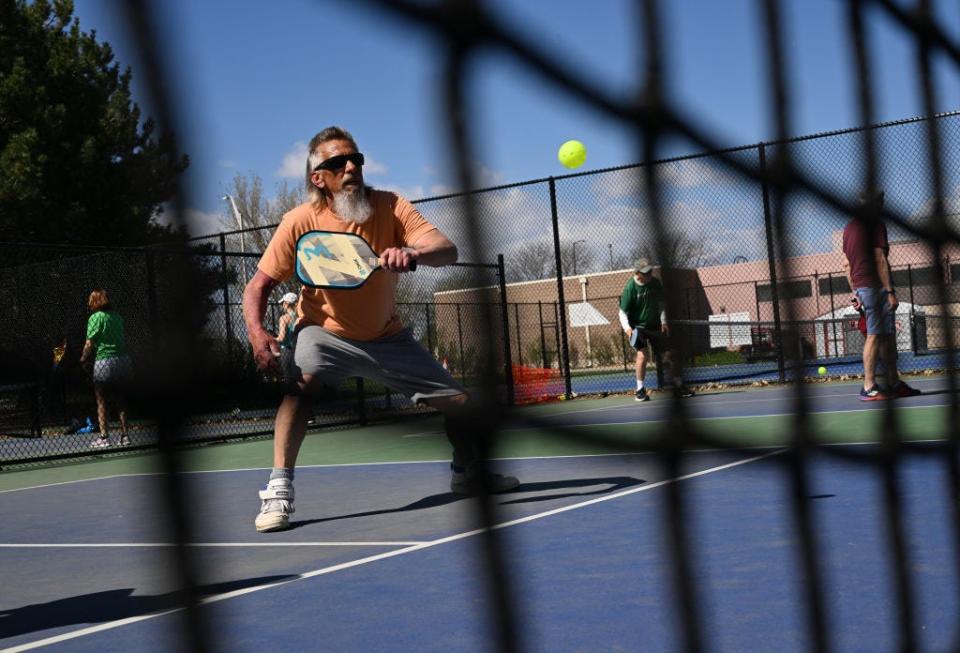The noise from pickleball courts is driving everyone crazy. Scientists are trying to come up with a solution.
The pickleball craze has led to tens of thousands of courts being opened in the US.
The noise is leading to complaints, lawsuits, and even hunger strikes from local residents.
The industry is scrambling to find solutions to the noise pollution.
"Plink! Plink! Plink!"
At first, the noise of pickleball seems fairly inoffensive. But as the sport continues to rise in popularity, bolstered by tech elites and one-percenters, it has left a slew of noise complaints in its wake.
Local residents have called the police and filed lawsuits. Some councils and park officials have banned the sport locally.
One couple in British Columbia even went on a hunger strike, claiming they had suffered from insomnia, auditory hallucinations, and heart flutters since pickleball games had intensified in their neighborhood, per the Washington Post.
Now, scientists are looking into everything from acoustic fabrics to court spacing in a bid to come up with a solution.
Why is pickleball noise so annoying?
Pickleball had 8.9 million players in the US 2022, 158.6% growth over three years, per a Sports & Fitness Industry Association (SFIA) report.
The US has more than 50,000 courts, but the SFIA estimates about another 25,700 will be needed to meet player's demands.
That means more courts are being built near residential areas — something which has become a source of tension.
People have compared the sound of pickleball to a pistol range, torture, and even hell, The New York Times reported. Sue-Ellen Welfonder, a best-selling romance novelist told The Times she'd made pickleball-loving characters "really nasty people" in her new book after the game ruined her visit to her local park.
Pickleball whacks are loud — they have been registered to reach 85 decibels, though games usually peak at about 70 decibels or about as noisy as a vacuum cleaner or a freeway. But that's not loud enough to damage the ears, professor Nicole Laffan told Northeastern Global News.
"Real pain" happens at around 120 to 140 decibels, Laffan said. "Pickleball is nowhere near that."

The sound's irksome nature likely comes down more to its pitch than its volume, scientists said.
Kausik Sarkar, a professor at George Washington University, studied pickleball strikes for network WUSA9. He found the plastic ball makes a mid-frequency noise when it hits the paddle. A tennis ball, by comparison, will make a lower-frequency thud.
Mid-frequency sounds are easier for humans to pick up, American University audio technology professor Braxton Boren told WUSA9, so they will "actually sound louder than the same amount of sound pressure at a very low frequency or at a very high frequency."
Another issue is that the soundscape associated with pickleball is very unpredictable. The sport is played on smaller courts than tennis, which means that players are quickly exchanging balls. Sports complexes can also pack more players into their facilities, which means more celebratory cries.
"Things like pickleball, things that are more impulsive with unpredictable spikes where there will be some noise and then some silence and then some noise, that almost continues jarring your attention," said Boren, per WUSA9.
The industry is scrambling to find solutions
One way to solve the problem is with careful city planning, said pickleball aficionado and Carnegie Mellon University professor Bob Unetich.
The engineer founded Pickleball Sound Mitigation LLC, a firm that specializes exclusively in the sport, per The Hustle.
For Unetich, courts more than 977 feet away shouldn't pose much of a problem to residents. He estimates that only a few hundred courts in the US are below that barrier.
"Towns are often doing this without any regard to sound because they haven't thought about it," Unetich said, per The Hustle.
But with demand for the sport increasing, finding spots that are far enough away may become trickier, he said.
Sound barriers can reduce the sound of the game by 10 to 15 decibels, but they are costly, at about $50,000 each, per The Hustle.
Another way to dampen the sport is by changing the gear.
The national governing body for the sport, USA Pickleball, has been "making considerable investments" over the past 15 months to find high-tech solutions to pickleball's noise problem.
The organization has been working with acoustic experts to identify acoustic fabrics and panels that could help reduce the noise made by the kit.
Last Tuesday, it announced the certification of the first product in its newly launched "quiet category," which aims to reduce the game's acoustic footprint by "50% or less."
The OWL paddle delivers a lower frequency whack, USA Pickleball said in a press release, peaking at 600 hertz, and a decibel level below 80.
"For comparison, industry-standard pickleball paddles register 1,100-1,200 hertz and a near-harmful decibel range of 85+ when striking a ball," per the statement.
The organization hopes the "quiet category" could soon "encompass a wide range of products, including paddles, balls, paddle covers, and noise mitigation screens for pickleball courts," the statement.
USA Pickleball is also compiling a list of acoustic experts trained to help dampen the noise of the game, per Axios.
Carl Schmits, managing director of equipment standards and facilities development for USA Pickleball, told Axios news that experts were at first "concerned that the technology required to reduce the acoustic signature [of pickleball] would significantly change the nature of the sport."
At the moment products like the OWL paddle are only approved for recreational use. Whether or not they will be embraced at an elite level will be the ultimate test of their success.
Read the original article on Business Insider

